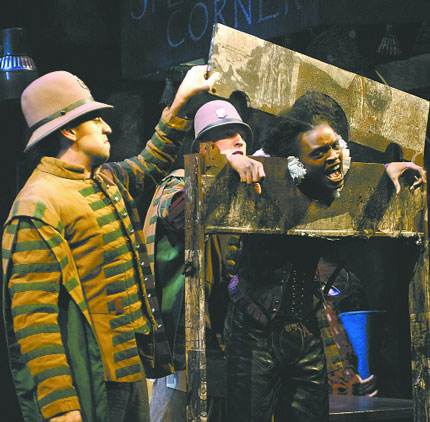Mike Albo, Alice Tuan look at women’s freedom in an age of anxiety
In a time when anxieties over personal safety have us seeking solace in the artifice of reality TV, two ambitious works question the rules by which we live, the role of women in that world, and the very concept of what is real.
Playwright and performer Mike Albo stages his original work, “3 Women in Indecision,” while Alice Tuan tackles the Middleton & Dekker comedy from 1611, “The Roaring Girle.”
Albo, of Dazzle Dancer fame, presents an innovative, if slightly disjointed work, showing in three vignettes how women who initially are self-assured reach pivotal, life-changing moments only to discover that others call the shots.
In the first, Helen, a receptionist at a New Age-y wellness center, accidentally kills a potential client/potential terrorist frustrated at the screening process. A disembodied voice that instructs Helen to follow the “PLAM” procedure to test the unfortunate corpse for trip wires is alternately ready to sacrifice Helen, or make her a hero.
The second vignette opens on the set of “Entertainment Eye,” a Hollywood-insider news show hosted by two dissembling anchors––they appear all-American, but he adopts a false Texas twang, and she is a lesbian. As anchor Candace dashes home to recharge her WorldPhone, she is accidentally doused by carbonated water, to which she is deathly allergic. Forced to deliver a surreal deathbed broadcast, Candace is even upstaged in death, as her shiny-suited co-host asks, “Frank, do you want to get me reacting to that?”
The fun times keep rolling when Denise and Jess, winners of the reality TV show “Seduction Mansion,” vacation in the island resort of Cleightwasjh. After an avenging ghost threatens to drag Denise to a watery grave, the players unmask themselves, and the joke is on her: the island resort was the real reality show. Jess delivers the same “I want to discover each other outside this magical place” speech as at the end of the fake reality show, and Denise is left to guess what is real.
Albo’s use of video, depicting reality TV sexcapades with Barbie Dolls, is reminiscent of Todd Haynes’ “Superstar: The Karen Carpenter Story.”
Though the three protagonists succeed in their (albeit very artificial) occupations, they ultimately have no control over their life. “3 Women” examines how technology empowers but simultaneously disappoints us, and questions whether artifice is in fact what we value.
In “The Roaring Girle,” Tuan also questions our values by examining the arbitrary rules by which we live. Tuan swims against the tide in staging this Jacobean play, considered all but unproduceable, with five subplots, 48 characters, and an unusual sense of satire.
The story revolves around Moll Cutpurse, 17th century London’s most notorious cross-dresser. This “Roaring Girle” helps empower poor Mary Fitzallard to wed Sebastian, son of the power-hungry Magistrate Wengrave.
This is a timeworn tale, but Tuan turns it on its head by setting it in a modern day dystopia, where “free speech” costs, theater is illegal, beauty is mandatory, and days have corporate sponsorship.
Where others are content to sidestep the law, the leggy Cutpurse, a “girlfriend queer in the front and the rear, him or her, it’s not so clear,” flaunts it; she smokes, drinks, steals, and holds an open casting call for her play.
The players stage a marriage, where the magistrate eventually consents to the union of Sebastian and Mary, fearing his son will marry Moll.
“This is what you might call, officer, a reality show,” says Cutpurse when apprehended, answering the running query, “Is this a wedding, or is it theater?”
The cast, including downtown luminary John Epperson, aka Lypsinka, gives a first-rate performance. Okwui Okpokwasili, as Moll, rises to the challenge of how to fit “fuck” into iambic pentameter.
The city street set is akin to a Renaissance fair, meshing wooden storefronts with bodega awnings where vendors hawk bread, batteries, and Henri Bendel.
The players are similarly discordant, clad in codpieces and Converse, heavy gowns, and high-heel sneakers. A lute player plucks out Led Zeppelin while a lover raps in meter to her fanny-pack sporting fiancé. When matters turn to money, players throw open windows and chime “Ka-ching!” a la “Rowan and Martin’s Laugh-In.”
The production quality soars, but ultimately, history trumps, as the play has simply too much going on to translate well onstage.
But Tuan, like Albo, makes a strong statement about our Patriot Act society where free speech exacts a crippling price; where women are a commodity served up to a midget groom, but gays are prevented from tying the knot.


































